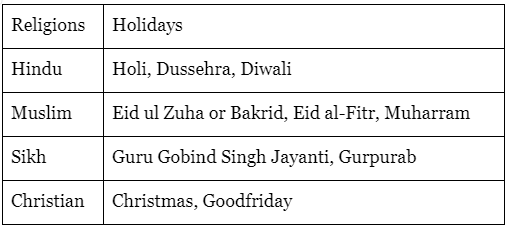Class 8 Civics Chapter 1 Question Answers - Social and Political Life - III
Q1: Will the government intervene if some religious group says that their religion allows them to practise infanticide? Give reasons for your answer.
Ans: The government will surely intervene if some religious group says that their religion allows them to practice infanticide because it involves killing of innocent child, which is against fundamental right – The Right to Life. No one is allowed to go against fundamental rights. Everyone’s right to life shall be protected by law.
Q2: How does the Indian constitution ensure its objectives of secular state?
Ans: The Indian Constitution ensures its objectives of a secular state in the following manner:
- One religious community does not dominate another;
- Some members do not dominate other members of the same religious community;
- State does not enforce any particular religion nor take away the religious freedom of individuals.
Q3: Give one example to prove that the Indian secular state can intervene to prevent the religious domination concerning different groups of the same religion.
Ans: We can prove this fact with following example: Where members of the same religion (‘upper-caste’ Hindus) dominate other members (some ‘lower castes’) within it. In order to prevent this religion-based exclusion and discrimination of ‘lower castes’, the Indian Constitution banned untouchability. In this instance, the State is intervening in religion in order to end a social practice that it believes discriminates and excludes, and that violates the Fundamental Rights of ‘lower castes’ who are citizens of this country.
Q4: In what ways does the Indian state work to prevent domination of the majority religious group?
Ans: The Indian State works in various ways to prevent the domination.
- First, it uses a strategy of distancing itself from religion. The Indian State is not ruled by a religious group and nor does it support any one religion. In India, government spaces like law courts, police stations, government schools and offices are not supposed to display or promote any one religion.
- The second way in which Indian secularism works to prevent the above domination is through a strategy of noninterference. This means that in order to respect the sentiments of all religions and not interfere with religious practices, the State makes certain exceptions for particular religious communities.
- The third way in which Indian secularism works to prevent the domination listed earlier is through a strategy of intervention. The State intervenes in religion in order to end a social practice that it believes discriminates and excludes, and that violates the Fundamental Rights of people who are citizens of this country.
Q5: Find out some examples of different views within the same religion.
Ans: Different views are found within the same religion. For example:
- In Hinduism, there are Vaishnavism, Shaivism, Shaktism and Smartism.
- In Muslim community, there are Sunni, Shia, Ahmadiyya and Quranists.
- In Jainas, there are Shwetambar and Digambar sects.
- In Buddhism, there are Hinayana, Mahayana and Vajrayana.
Q6: Look up the annual calendar of holidays of your school. How many of them pertain to different religions? What does this indicate?
Ans: Holidays in school calendar This indicates that India is secular country where religious freedom is granted to its citizens and all religions are equally respected.
This indicates that India is secular country where religious freedom is granted to its citizens and all religions are equally respected.
Q7: List the different types of religious practice that you find in your neighbourhood. This could be different forms of prayer, worship of different gods, sacred sites, different kinds of religious music and singing etc. Does this indicate freedom of religious practice?
Ans: The various types of religious practice found in our neighbourhood are:
- Hindu performing Puja and Havan
- Muslims offering Namaz
- Sikhs visiting Gurudwara
- Christians praying in Church
There are churches, gurudwaras, mosques and temples in our neighbourhood. People of different cultures and religions stay together and celebrate festivals. This indicates that all the citizens are able to practice their religion with freedom in secular environment.
Q8: The Indian State both keeps away from religion as well as intervenes in religion. This idea can be quite confusing. Discuss this once again in class using examples from the chapter as well as those that you might have come up with.
Ans: In Indian secularism, though the State is not strictly separate from religion, it does maintain a principled distance vis-à-vis religion. This means that any interference in religion by the State has to be based on the ideals laid out in the Constitution.
For example:
- Where members of the same religion (‘upper-caste’ Hindus) dominate other members (some ‘lower castes’) within it. In order to prevent this religion-based exclusion and discrimination of ‘lower castes’, the Indian Constitution banned untouchability. In this instance, the State is intervening in religion in order to end a social practice that it believes discriminates and excludes, and that violates the Fundamental Rights of ‘lower castes’ who are citizens of this country.
- Similarly, to ensure that laws relating to equal inheritance rights are respected, the State may have to intervene in the religion-based ‘personal laws’ of communities.
- The intervention of the State can also be in the form of support. The Indian Constitution grants the right to religious communities to set up their own schools and colleges. It also gives them financial aid on a non-preferential basis.
|
69 videos|426 docs|46 tests
|
















